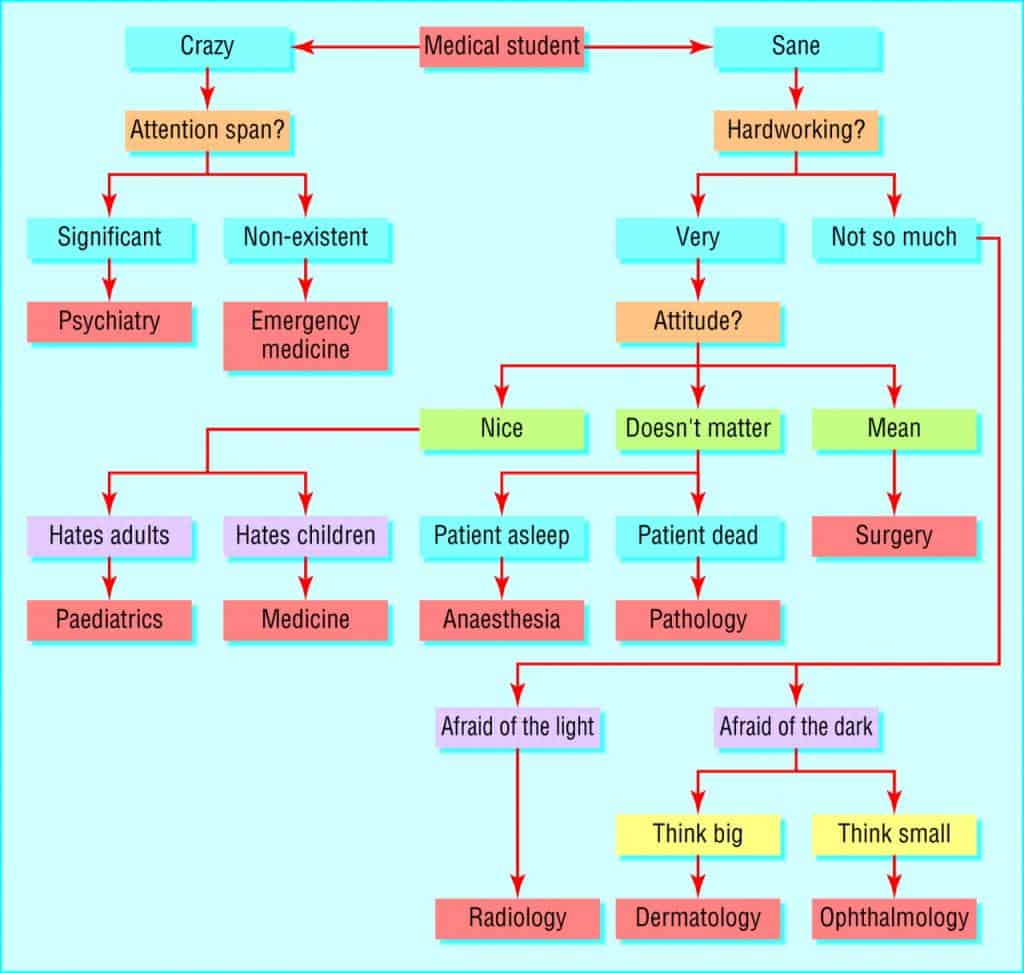How to Self-Reflect and Choose Your Medical Specialty This Year

“Keep your minds open,” the dean announced at M3 orientation, “Maybe you’ve always dreamed of becoming an orthopedic surgeon but will fall in love with psychiatry.”
As freshly minted third-year medical students with wrinkle-free and yet-to-be coffee/pen/bodily fluid-stained short white coats, we entered clinical rotations much like undifferentiated cells, eager to be shaped and influenced as we transformed into the future physicians we were to become. However, for many students, choosing a specialty is not as easy as dreaming and falling in love. There is a fine line three-quarters into M3 year when the reaction to uncertainty about choosing a specialty changes from a response of “you’ve got time” to a reaction that may make you feel like somehow over a few short months you became defective. In the midst of the uncertainty and doubt, you then receive an email that it’s time to schedule your fourth-year electives and are advised to “choose them wisely” as you are reminded that residency applications will be due just three months into the year. If that story sounds all too familiar or if you anticipate that it could happen to you, don’t panic, you’re not alone, let’s get through this together.

In navigating this decision-making process, I was advised that if I could just decide between surgery vs. medicine, kids vs. adults, specializing vs. staying broad, continuity of care vs. emergency, interacting with patients vs. not, and taking lifestyle in consideration, POOF, I would have my answer. In an attempt to guide students, one such algorithm was published in an article featured in the British Medical Journal by Dr. Boris Veysman.
Unfortunately, despite the color-coded flow chart, it’s not that simple.
One resource that may help you think more holistically about yourself within the specialties is through the AAMC Careers in Medicine website, where you can find a Medical Specialty Preference Inventory. After answering 150 questions, you receive an assessment with the probability that you will enter into 1 of 16 specialties based on your interest in performing specific activities in medicine. You can compare your “Medical Interest Scale” to the typical range within the individual specialties. This information can provide insight into where you might fit best or clarify what might be a challenge for you in a given specialty. Give it a try and let me know how it goes.
If after going through that exercise you still find yourself staying up all night Googling “How to choose a medical specialty” and are finding that everyone’s two cents are making your head spin, I recommend taking a step back and looking at the bigger picture.
It was during this time in my own journey that I discovered the Passion Planner, a book that can be ordered online (for every one purchased, one is donated) or is available as a free download. The planner was developed as a tool to help individuals clarify and define their goals and dreams and break them down into actionable steps. Whether you are looking for a day-to-day guide or just want to invest 15 minutes in a reflective activity, there is value in going through the Passion Roadmap exercise.
The instructions are simple: set a timer for five minutes, and imagine that this piece of paper is magical—whatever you write in it will come true within the designated time frame. Think of it as a wish list describing your ideal life. Ask yourself, “If I could be anything, do anything, or have anything, what would it be?” Write every single thing that comes to mind and be as specific as possible. Lastly, do not feel the need to be realistic or justify your dreams. Just write.

The next step is to set a one-minute timer and circle the one goal in each of the four sections that would have the most positive impact on your life. Then, choose a “game changer,” the goal that would have the most positive impact on your life right now. Take five minutes to write down the steps you must take or tasks you must complete to reach your goal. Create a timeline using these details of what you need to do.
Try it out, you might be surprised by what you find.
When I did this activity at the height of my “specialty crisis,” I was shocked to discover that what I needed most, my personal game changer (even more than envisioning myself in a given specialty), was to go on a camping trip and be entirely immersed in nature. Despite my love of mentorship and advice, I needed time and space away from all the noise, stress, and technology to reflect on my decisions without searching for my answer externally. Going on a camping trip turned out to be the catalyst that recentered me and allowed me to move forward in making confident decisions.
Another great tools from the Passion Planner is a monthly reflection with six questions:
- What was the most memorable part of this past month? Describe it.
- What were the three biggest lessons you’ve learned this past month?
- Review your past month and assess your priorities. Are you happy with how you spent your time? If not, what steps can you take this next month to adjust them?
- How are you different between this past month and the month before?
- What or who are you especially grateful for this past month?
- Name three things you can improve on this upcoming month. What are concrete actions you can take to work towards these improvements?
Answering these questions during times of uncertainty can be grounding and remind you that despite not knowing what the future may bring, we are not stagnant in the present and there are growth and opportunities for gratitude right now. I challenge you to give it a shot and see what you learn.
I also encourage you to think broadly and creatively about your career path. If after evaluating all of the specialties you still find yourself stuck, give yourself the freedom to ask whether you want a career that is clinical vs. nonclinical. There are job opportunities for medical school graduates that may be a better fit for some people than becoming a clinician. While medical training is often a long and linear process, it certainly does not have to be that way. Examine your skills, talents, and interests and ask yourself how you might be able to combine them in a way that is most meaningful and fulfilling to you.
As residency applications came out during my fourth year of medical school, I had to be honest with myself and acknowledge that it wasn’t the right time to move in that direction. I decided to take a gap year and spend time delving into my passions that had been on the back burner during medical school. I expanded my knowledge and love of nutrition in a certification program that gave me the skills to work with my future patients to use food as medicine in both the management and reversal of chronic diseases. I then explored my interest in the media and public health by working as a medical producer of a TV show, which gave me insight into the behind-the-scenes aspects of how health information is produced. Finally, I am working on creating content for medical students with Rosh Review, which allows me to channel my passion for medical education and providing support for those going through this journey. Following these experiences, I am prepared and ready with a new skill set and great enthusiasm to pursue a Family Medicine residency.

It is my greatest wish that at every stage in your life, whether you are a premed, medical student, resident, or attending, you gift yourself the time and space to openly and honestly evaluate your options to create a masterpiece of a life that uniquely fits you.
Get Free Access and Join Thousands of Happy Learners

You must be logged in to post a comment.





Comments (0)